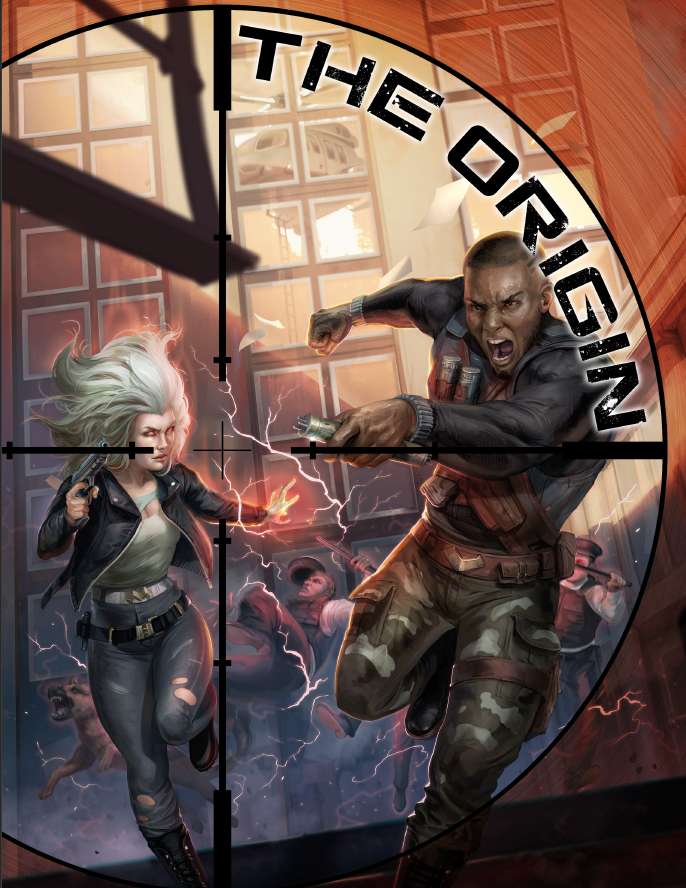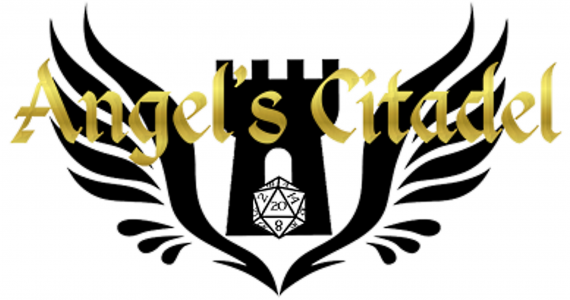
If you’ve followed our blog here, or our Twitch streams, or know us personally in a Tabletop Roleplaying Game context, you’ll know that while I will play basically anything (especially if my wife is running it – She’s my favorite GM), I freely admit that superhero games really aren’t my bag. For the most part, comics gave me a miss, and while I have enjoyed most of the superhero movies/shows that I’ve seen, I’ve seen less than half of the ones available. If I’m picking, the game we play will not be a superhero one.
Now, with that being said, I will offer this bit of information. When we backed the Claim the Sky Kickstarter, I decided I would back it because it was Monte Cook Games and I love their quality, but I was frustrated that it wasn’t really going to offer anything for me. Right up until I heard about the Origin, that is. This book is what sold me on that Kickstarter and for this review, I’ll tell you why, and why you need to add it to your library.
Production & Manufacturing
A 162-page hardback presentation, the Origin, by Bruce Cordell, is yet another fantastic offering by the Monte Cook Games production team and their vendor partners. With high-quality binding, paper, ink permeation, and placement, This book is meant to last and stand up to use. The layout is consistent with previous Monte Cook Games offerings, so if you are familiar with their format, using this book will feel like second nature.
While the art in this particular volume has the same quality and production value as in others, for me personally, it didn’t help as much as it usually does to put me into the setting (like with Numenera or Invisible Sun). I’m honestly not sure why that is. Technically, I don’t think the art is “bad” or anything, it just feels almost sterile to the setting. Obviously, this is my personal opinion, and this is not indicative of their product lines as a whole (see my other reviews of MCG products for reference).
Content
The Origin is a setting book for the Cypher System. Similar in nature to Predation or Gods of the Fall, it contains information for the GM on a playable setting in which to base your Cypher System game. It is not a complete game, however. The Revised Cypher System Rulebook is necessary to play. The thing about the Origin is that it feels somehow like Heroes the roleplaying game crossed with White Wolf’s Hunter: the Reckoning. For those of you who have not seen the show or, like me, all of it, Heroes was a network television drama aired on NBC about humans that discovered they had superpowers and ultimately, what they did with those powers. Naturally, because that’s what always happens, the government/military gets involved and shenanigans ensue. The thing that struck me about the part of the show that I watched (mostly the first season) and that strikes me about the Origin is the grittiness of it. These are not egotistical superheroes who are seasoned, have massive power bases, and have been doing this for a while. These are people just finding out about their powers. It’s street-level. It’s personal. It’s visceral. And that is a feeling I can get behind in a roleplaying game. The first chapter gives some basic information about the world as it exists in this setting.
Characters for a campaign in the Origin can either be created as normal humans who gain their powers during the first adventures or as individuals who have already discovered that they have abilities beyond the norm and have to figure out how to deal with them. Chapter 2 discusses this and gives guidance on how to create characters for the Origin inclusive of their heroic power shifts. Finally, it discusses the feel of an Origin campaign, particularly as it relates to how NPCs look at PCs and then how a GM might run such a game. Chapter 3 discusses an interesting twist to this setting. Since the PCs are “learning” to be superheroes, in other words, they haven’t mastered their powers yet, there is a very real possibility that those powers will at least initially pose danger for them and those around them. Most of these consequences are handled via GM Intrusion as introduced in Horror Mode (Revised Cypher System Rulebook, p. 283) but without escalation (simulating the slow burn of responsibility). There is lots of advice on how to look at these kinds of GM intrusions thematically which is particularly helpful here.
Chapter 4 goes into a reskin of manifest cyphers to be more thematically appropriate to the Origin (a trick we discussed here) resulting in Divergent Timeline Cyphers. Going along with this, chapter 5 discusses some setting-specific Artifacts for you to use in your game. Both of these chapters offer quite a few pre-detailed objects that you can just drop into your game. In addition, characters will also be in possession of Subtle Cyphers and because it’s me, I’ll just say that there’s a deck for that.
Chapters 6 and 7 go into the setting in deep detail, both in the history of what happened and why your characters remember it while most other people do not. They discuss the major secret organizations that are movers and shakers in the world and describe some of the covert locations that exist, even going so far as to give some cartography to go with some of these places. Chapters 8, 9, and 10 deal with NPCs (both friend and foe), monsters, and a new group of adversaries known as Collectors. No, I’m not going to tell you what the Collectors are here (spoiler). Chapters 11-14 contain 3 full adventures and an “interlude”. The first of these, An Evening at the Opera is designed as a way for the GM to take normal humans and introduce them into an Origin campaign organically. The other two adventures are designed to be “later” adventures in an Origin campaign, with the one titled Threshold to Apocalypse really starting to dive into some of the setting’s secrets.
Critique
It’s difficult for me to find some useful criticism for this when I think it hits all the right notes for me. About the only thing that I would suggest, and this is something that MCG has done fairly well in the toolbox books (the Stars are Fire, Stay Alive!, etc…), but not so much in the setting books, is that in addition to “full adventures”, which are already quite good and helpful even for new Cypher GMs, to add setting-specific “hooks” as examples to riff off of in a campaign or even to use wholesale. By way of example, I’ll use myself.
At the beginning of this review, I mentioned that I’m not typically “the superhero guy”. In other words, it’s not even that I don’t play around in tabletop roleplaying games in the superhero genre very much, it’s also that I don’t typically read superhero comics or graphic novels, don’t typically watch those kinds of movies, and TV shows, and don’t often play those kinds of video games. As such, the “inspirational” ideas that someone might have to feed a campaign like this are not there. I am, however, as often as not the GM in a given group that I play with. Having a list (whether I roll randomly or pick it) or even better, some kind of “builder” (a la Numenera’s Jade Colossus Ruin Builder or something) that would help me to generate the seed of an exciting setting-appropriate adventure even if I do not personally have outside background knowledge, would be super helpful.
Summary
Bruce R. Cordell’s the Origin is the last book offering from Monte Cook Games’ Claim the Sky Kickstarter and is a gritty, original superhero setting. It requires the use of the Revised Cypher System Rulebook to play. The players play characters who just came into their powers and the world at large does not know about them. There are sinister forces at play that do, however, and mystery surrounds both how the characters got those powers, and why people seem to be after them now. This is a setting that I would recommend simply for its originality in the genre, but further, if you are looking to try a much more personal, adventure thriller-type superhero game rather than the typical, god-like stories you find so often in Marvel and DC fame, and traditional superhero tabletop roleplaying game offerings. Happy gaming!
- Josh Walles

What’s interesting to me is, I think MCG has done a better job on setting books (e.g. Gods of the Fall), than the toolbox books (e.g. Godforsaken). Maybe it’s all the Hero Games background I have, where information on how to make my own stuff isn’t that useful to me. Different strokes, for different folks.
LikeLike
This is a really interesting take. I think the two types of books are “different” and MCG has done a good job on both of them, but they are absolutely NOT for everyone or “one size fits all”. Even among the toolbox books, the utility is variable. For example, I personally think that Stay Alive! is the best of all of them even though I’m much more likely to run a sci-fi or a fantasy game because of my personal preferences. Thanks for commenting!
LikeLike